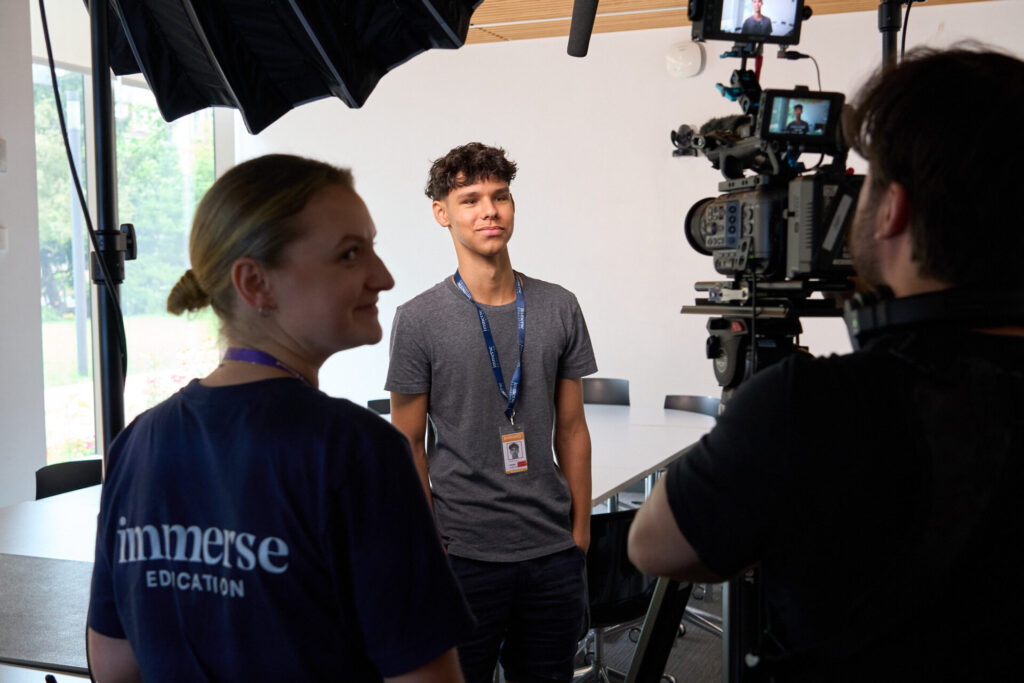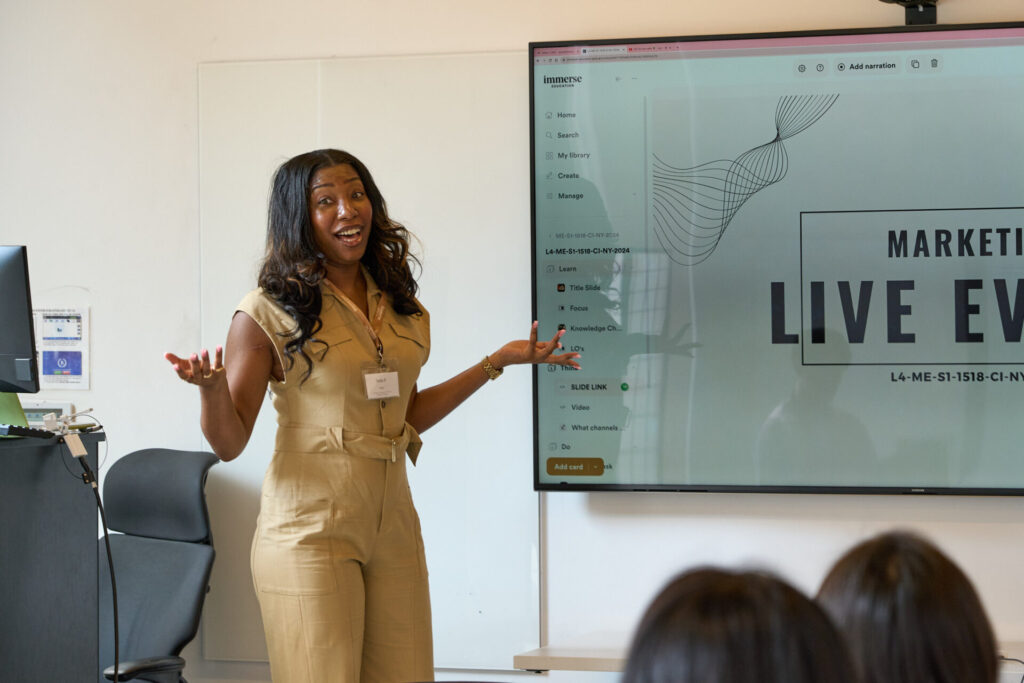The House of Commons Library reports that in November 2023, there will be 33.05 million people in the UK workforce, of which 18% will work in engineering. In other words, becoming an engineer will most likely guarantee you a job in our country. It could be with a private organization or the public sector, or you could become a self-employed engineer. But what matters is that there is a need for these professionals and room to grow.
Trust us when we say that this is a key factors to consider for your university degree. You don’t want to embark on a 3 or 4-year adventure only to find that there are no jobs in your field.
On the plus side, engineering is one of those fields where you can choose from many different career paths: civil engineering, cybersecurity, aerospace, mechanical, etc. All of which are in high demand in the world we live in. Technology is forcing us to come up with different advancements to make our lives easier and protect us from any cyber threats.
The need for engineers is real, the employment of engineers is expected to grow by 4% between 2018 and 2028. And in the UK, you can expect to earn a salary of £38,624. But to get there, you need to start working on your resume, skills, and experience from day one.
Let’s take a closer look at the different traditional subjects, the less obvious but beneficial subject choices, and the extracurriculars that will make your path into the world of engineering much easier.
Traditional Subjects that Will Help You Have a Strong Foundation in Engineering
Your preparation for engineering school begins early in high school. There are key classes that will help you build a strong foundation, so you need to make the most of them and learn as much as you can from each class.
Mathematics
Of course, the first and most important traditional subject is mathematics. It lays the foundation for calculus, algebra, and statistics, which come in handy when you need to design structures, predict behavior, and optimize systems. Every field of engineering (electrical, aerospace, systems, civil, etc.) uses mathematics daily.
You can expect your first year in engineering school to be filled with general science and math. You will take courses in calculus, chemistry and physics, statistics, dynamics, and probably some introductory courses. They are there to help you develop a strong foundation in engineering principles and practices, critical thinking, and problem-solving skills.
Please note that for you to get accepted into a UK university for an engineering degree you will typically need A-levels or equivalent qualifications in math.
Physics
While all types of engineering need physics, they need it to varying degrees. For example, a civil engineer needs to understand these concepts to successfully design and develop infrastructure, including roads, bridges, and buildings. A systems engineer, however, will use them only for very specific tasks.
Taking and passing physics courses in high school will help you become familiar with the concepts and problem-solving techniques. In addition, to be accepted at a UK university for an engineering degree, you will usually need to have an A-level or equivalent qualification in physics.
As we have said, you can expect to study a lot of physics in your first few years at university.
Chemistry
As with math and physics, UK universities are very likely to require A-level or equivalent qualifications in chemistry to accept students into their classes. High school chemistry will help you build the foundation and make your first couple of university years easier for you.
Of course, how deep into chemistry you need to go will vary depending on the type of engineering you want to study. Someone who chooses mechanical engineering or software engineering will only need the basics, but if you’d rather go into petroleum or chemistry engineering then this will be a major subject as it’s designed to teach you about materials, substances, and processes to create products and systems.
Computer Science
We have said it before: we live in a world where technology is improving and changing the way we do things. Having the chance to get into a computer science class while still in high school will help you build a foundation in programming and software development, skills that are highly sought after by recruiters and hiring managers.
The earlier you are exposed to these concepts, the easier it will be for you to understand how they work and add them as skills to your profile.
The key point here is that each of these four courses introduces key concepts that will help you understand the path you want to take and lay a foundation for success by developing your analytical and problem-solving skills. It’s up to you to ace these classes, but remember that becoming an engineer is not an easy path. Calculus, algebra, statistics, and physics are just a few of the key courses you will need to take to earn your degree.
Less Obvious but Beneficial Subject Choices
So far, we have seen the most obvious courses to take as you begin to prepare for engineering school. But there are others, most likely offered by your high school, that will also play a key role in your professional development and success in obtaining your engineering degree.
Environmental Science
Lessons in this subject cover a wide range of topics, including ecology, biosphere, land, forest, soil, water, energy resources, ecology, societies, and more. In addition, you will have the opportunity to learn about scientific theories, concepts, and current world dilemmas. Ultimately, these are important foundational concepts for becoming an engineer. Part of your daily work will involve pursuing sustainability through your chosen specialization.
Economics
Taking and completing an economics course in high school will give you a well-rounded understanding of basic economic theories and principles that you can then apply to engineering projects and processes.
Some of the topics you can expect to see in this class are supply and demand, competition, taxation, international trade, price controls, exchange rates, interest rates, and others. While also guiding you on financial management budgeting, investing, saving, market structures, productivity, etc.
In the end, all of these lessons will come in handy for your financial planning and success.
Rounding Out with Extracurriculars
Of course, the work does not stop there – you want to be fully prepared for your next four years of engineering studies at the university. The more you can learn at high school, the easier it will be for you. And you need to focus especially on two things: gaining practical hands-on experience and developing relevant skills for your future. Let’s take a closer look at each one.
Gaining Practical Experience
Preparing for engineering school while still in high school will help you build a more competitive profile and increase your chances of getting into different universities and programs. At the same time, spending time gaining hands-on experience serves as a way to find your passions and understand if engineering is the field you want to enrol in and what specific career path you want to follow.
There are several ways to help you in this process:
- Get an internship: A first job related to the field will help you put into practice the math and science concepts you have learned over the past few years while exploring the different specializations the engineering world has to offer. Plus, adding this experience to your resume will make you more employable in the future than someone without previous work experience.
- Volunteer: Getting involved in your community not only demonstrates your commitment to real-world issues but is also a way to learn more about environmental and societal problems and how to solve them. Consider volunteering at a local museum, camp, or STEM program.
- Shadow a professional: Spending time with a full-time engineer is an interesting way to better understand their responsibilities, tasks, and daily routines. It’s one of the best ways for you to understand if this is what you want to do in the near future.
- Hold Leadership Positions: Your school is most likely to have STEM-related organizations. Try to take a leadership role there so you can demonstrate your passion for engineering. Check out the robotics team, math groups, engineering clubs, or even coding teams.
Developing Relevant Skills
At the same time, you want to spend some hours working on your people skills and adding more to your profile. As a future engineer, you must focus on communication, writing, problem-solving, leadership, organization, and critical thinking.
To improve your communication skills, you must always ask your teachers and tutors for feedback when speaking in public. You also need to control your body language and make eye contact with your audience.
As for leadership, it’s important that you spend time doing teamwork activities, participate in student government, join or start a club and find volunteer work. Each of these things will help develop independence, efficiency, management, organization, and other traits common to leaders.
Problem-solving and critical-thinking skills are usually developed by asking questions, talking to others, reading, teaching, researching, and taking classes in core subjects like math and physics.
What skills do you think you already have? The fact that you can easily identify them in yourself only makes it more important that you work on them and fully prepare yourself for the future.
Join the Immerse Education 2025 Essay Competition
Follow the instructions to write and submit your best essay for a chance to be awarded a 100% scholarship.

Different Career Paths in Engineering
We have said it many times in this article: engineering is a field with a vast variety of career paths for you to choose from. Making that decision is not easy, many of them have very similar characteristics, while others differ a lot. You need to spend time researching and learning from all of them so you can make a better-informed decision. You want to avoid choosing one for only then to realize that was not what you were expecting to learn or work on.
Let’s take a deep dive into the most common paths in this field.
Traditional Engineering Fields
Among the most traditional engineering fields, you will find several options to choose from. Take note that they tend to have a traditional pathway that starts by earning your university degree. The most common include:
Civil Engineering: As a professional in this field, you would deal with the design, construction, and maintenance of the physical and natural built environment (bridges, roads, canals, dams, buildings, etc.).
Mechanical Engineering: This discipline focuses on applying the principles of physics and materials science to the design, manufacture, and maintenance of various mechanical systems. It also includes the design, manufacture, and operation of machines and tools. How would you like to work on a project like this?
Electrical engineering: Engineers in this field deal with problems related to large-scale electrical systems, such as power transmission and motor control. Do you see yourself working with power, electronics, or telecommunications daily?
Chemical Engineering: Specialists in this field are dedicated to converting raw materials into more useful or valuable forms. There is a lot of math, science, physics, and chemistry involved in the daily life of a chemical engineer.
Emerging Specialities
We live in an ever-evolving world where technology is forcing us to deal with modern challenges and innovations. In this process, the engineering world has had to find new ways to keep up. In recent years, we’ve seen new specialities emerge, and as they become more important, you must know about them. Museums, magazines, conferencers, podcasts, and LinkedIn are great places for you to keep up to date with trends and the industry in general.
Renewable Energy: This specialization focuses on the design and implementation of renewable energy systems to provide clean, efficient, and reliable power while reducing dependence on fossil fuels and their impact on the environment. You may find yourself designing machines and other devices to use energy more efficiently.
Nanotechnology: This is an emerging engineering discipline that involves the design, development, and implementation of innovative solutions at the nanoscale. You can see yourself using nanoscience and nanotechnology to create new materials, structures, devices, and systems.
Biomedical engineering: The focus here is on improving human health. As a biomedical engineer, you would design equipment and devices (internal organs, replacement body parts, etc.) and machines to diagnose medical problems.
As if that were not enough, there are other options you can choose from that involve engineering skills and other disciplines to answer or solve complex problems. Some examples include
- Sustainable Engineering: You would be involved in designing solutions that minimize environmental impact and contribute to sustainability.
- Robotics and Automation: As an expert in this field, you would be responsible for designing robots and automated systems to perform complex tasks for manufacturing, healthcare, and service industries.
- Artificial Intelligence (AI) and Machine Learning (ML): Your focus in this area would be on applying AI and ML to solve engineering problems, optimize processes, and create intelligent systems.
- Data Engineering: If you are considering this path, you need to understand that it involves the collection, storage, and analysis of data to support decision-making in various engineering fields.
Research and Development (R&D)
As a future engineer, you may choose to specialize in R&D and dedicate your life to conducting research and implementing solutions within an organization. In other words, you would be constantly working to understand different problems that an organization might be facing and trying to find solutions, solve problems, and investigate industry trends.
This is a subset of engineering and an ever-changing role that largely involves:
- Developing prototypes based on your research.
- Designing and testing products.
- Redesigning or iterating on existing products.
As a high school student, you can participate in extracurricular activities or summer programs designed to help you develop these skills. Ultimately, the sooner you begin to familiarize yourself with these concepts and practices, the easier it will be to grasp them and move forward.
Engineering Management
You can also choose to help bridge the gap that exists between engineering and business management, dedicating your professional life to planning and coordinating projects and overseeing multiple activities related to research and development.
To become an engineering manager, you will need to earn a bachelor’s degree in engineering or engineering management and gain relevant work experience. In most cases, organizations will require a master’s degree in engineering management and professional certifications.
Consultancy
As you can see, this career path has many options for you to choose from, and one of them is working as an engineering consultant. In this case, you would be providing expertise and guidance to individuals, public and private companies on how to best meet their design and construction needs.
This can be a fulfilling and rewarding career choice, especially for those who are always looking to solve complex problems and make a difference.
Final Thoughts
Engineering is a smart career path that opens doors to employability, great salaries, many career opportunities, and personal growth. It takes more than a bachelor’s degree to succeed, but you need to start working toward it today.
Focus on excelling in your math, science, physics, and chemistry classes. Get involved in extracurricular activities that will help you develop the skills that will set you apart. Get your first internship, volunteer, or interview with a professional engineer.
Our advice: Don’t let others stop you from achieving your goals.
Looking to expand your career knowledge in engineering? Our summer programmes – will see you dive into hands-on projects, learn from industry experts, and prepare for a future in engineering. Join us for an unforgettable experience that will shape your career path. Enrol in an engineering summer programme today.


















